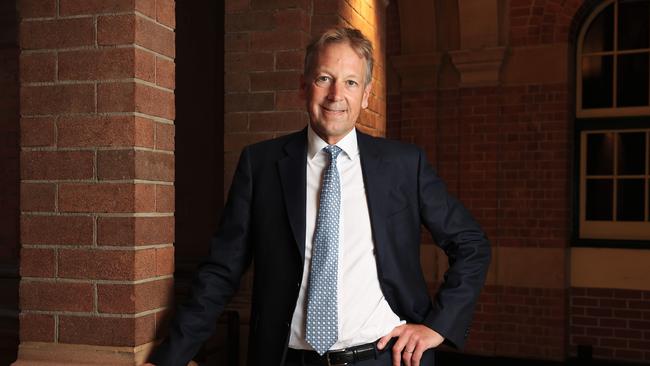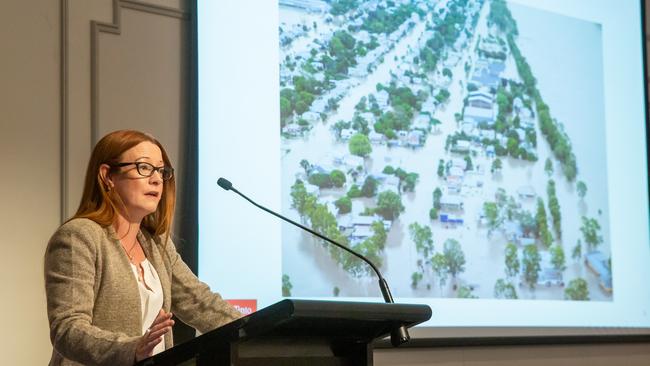Rio weighs up another lithium play with big move in Argentina on the cards
The Rio Tinto board is poised to give the green light to another big investment in lithium in Argentina at the urging of chief executive Jakob Stausholm.

The Rio Tinto board is poised to green-light another big investment in lithium in Argentina at the urging of chief executive Jakob Stausholm, who remains a big believer in the battery ingredient despite recent mine closures.
The Rio board is due to meet in Montreal, with a proposal to boost capacity at the Rincon project high in the Andes mountains to 60,000 tonnes a year on the agenda.
Barrenjoey noted Rio had included $US800m ($125m) of unallocated capital expenditure in its 2025 forecasts and speculated a chunk of that was earmarked for Rincon after the project received a glowing endorsement from Mr Stausholm and minerals chief executive Sinead Kaufman.
Iron ore and lithium stocks gained ground on Tuesday after China’s leadership foreshadowed a big boost in economic stimulus in 2025. Rio gained nearly 5 per cent, BHP about 3 per cent and Fortescue more than 6 per cent in trading on the ASX. Lithium pure play Pilbara Minerals jumped 6.5 per cent and embattled iron ore and lithium producer Mineral Resources was up 8.5 per cent.
China’s Politburo set the scene for more rates cuts in 2025 under a “moderately loose” monetary policy and an increase in government spending to boost the stalling economy.
Rio expects the lithium market to grow five-fold by 2035 and is banking on getting its timing right as it invests in growth projects against a backdrop of oversupply and low prices.
Rincon delivered first lithium from its 3000 tonne-a-year pilot plant in the past fortnight, about 32 months after Rio acquired the brine project for $US825m. It is also closing in on the $US6.7bn acquisition of Arcadium Lithium, with Arcadium shareholders due to vote on the takeover proposal on December 23.

Mr Stausholm told investors last week that along with chief financial officer Peter Cunningham and Ms Kaufman, he had been preparing to discuss the full scope of the Rincon proposal with the board.
He said Rio had solved technical issues and found ways to use far less water, and it looked like a very attractive project.
Rio has foreshadowed building three lithium super sites in Argentina and building out projects in South America and Canada that it would pick up from Arcadium, and has predicted sales of the battery ingredient could make up 13 per cent of its earnings over the longer term under plans to become less reliant on iron ore.
Ms Kaufman told investors breakthroughs at Rincon had opened Rio’s eyes to even greater potential in low-cost lithium production. “We’ve improved our recycling technology to halve the amount of water that’s required to produce a tonne of lithium carbonate equivalent, we’ve increased our mineral resources by 60 per cent and, in the intervening months, we’ve also developed a really strong, enhanced technical operational capability that gives us the confidence to really scale up the operations,” she said.
Ms Kaufman said the direct lithium extraction (DLE) technology employed at Rincon reduced waste and produced lithium more consistently from a quality perspective.
Rio said an internal analysis of every lithium asset available globally confirmed its brine projects and the $US2.4bn Yadar project in Serbia were at the bottom of the production cost curve.
The company is trying to advance the Jadar lithium project in the face of moves to ban lithium and borate mining in Serbia.
A number of Arcadium projects have stalled due to a lack of capital but Rio has flagged restarting work post-acquisition.
Ms Kaufman said the Arcadium acquisition would give Rio a network of hard rock and brine resources in Argentina and Canada, where it felt very at home.
“We have strong relationships in those areas, with governments, with communities, and also with First Nations, and these are complemented by a suite of downstream chemical processing plants that Arcadium brings in China, Japan, the UK and the US, all countries where Rio has long histories,” she said.
“So we have the ambition and the balance sheet to unlock the full potential of Arcadium’s assets at pace, and we intend to undertake an accelerated, phased development of the projects post-acquisition timed to meet future demand.”
Rio has welcomed policy changes to encourage investment under Argentinian President Javier Milei, and recently hosted governors from the country’s resource-rich provinces in London.


To join the conversation, please log in. Don't have an account? Register
Join the conversation, you are commenting as Logout